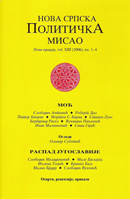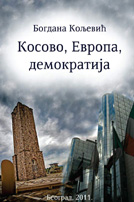| NSPM in English | |||
Soft Landing |
 |
 |
 |
| недеља, 06. јун 2010. | |
|
(Monday, May 24, 2010)
Minister Jeremić’s last appearance at the Security Council was good. Diplomatically, but still resolutely, he criticized Secretary General’s report and spoke openly about the pressure on countries which have not recognized Kosovo and on the International Court of Justice which should reach a decision, or “render an advisory opinion” on the unilaterally declared independence of the Serbian province. The state television broadcast his appearance, but consistently with its standard practice, the broadcast was over as soon as his speech was over. And so the Serbian public was yet again denied the information on what others had said, for example, the representative of Kosovo institutions, or what the ambassadors of leading world countries, USA, UK and France had said and in what manner. That’s all right. Not everything is supposed to be broadcast live. But no. Serbian media can go on for days about controversies about the gay parade, the love affair between two entertainers that ended in tragedy, love woes and bad manners of participants of Farma reality show, or about what happened to a misfortunate dog called Mila. However, there hasn’t been a single text, report or detailed account of how our Western friends treat timid efforts of Serbian authorities to preserve the territorial integrity of the country, or at least, to save their own reputation and that of the state. It is obvious that somebody wants to spare the people/citizens/himself/herself from bad news. And the speeches I mentioned were harsh, sharp and even threatening. There was not a single mention of “isolation of differences”, “agreeing to disagree” and other similar witticisms of our agile but naïve diplomats. It seems that these witticisms are good enough for Serbian public only, or to be more precise, to pacify and anesthetize them. For instance, did Mr. Jeremić, in accordance with his “isolation of differences” doctrine”, try to explain to his Western counterparts that they should not be annoyed at our opposition to Kosovo’s independence and that they should support our prompt accession to the EU anyway. And what do you think their response or outlook on that would have been? In brief, most of them still treat us as enemy, a defeated enemy, who might “generously” be allowed to more or less successfully conceal the defeat from the Serbian public. Somewhat less important, but similarly indicative is the slightly mislaid information that during his meeting with Hashim Thaçi the Turkish Prime Minister Erdoğan stated that his country will “do everything possible” to support Kosovo in lobbying for recognition of Kosovo’s independence and stated that he had already “spoken with officials of Azerbaijan, Qatar, Syria, Libya and Greece.” On the other hand, our president and foreign minister have posed as diplomatic “triplets” with their Turkish counterparts Davutoğlu and Gül for at least ten times in the last twelve months, or whatever we might call their smiling posing for photographs with their hands intertwining. Indeed, it might give us some comfort to know that, while on his way to Turkey, Thaçi was treated and searched like a common local smuggler by the International Police at Prishtina Airport, but that is his own problem and the problem of the entity of which he is the “Prime Minister”. The reality of Serbian foreign policy is somewhere between these three events. We can take comfort in the last one, but we must not turn a blind eye to the rest. And on no condition should we lull ourselves with tales of “regional leadership” or do things to preserve this virtual “leadership” that can only be detrimental in the long run, rather than useful. (Let us remember EULEX, the Srebrenica Declaration, which allegedly nobody demanded from us, political resurrection of Haris Silajdžić, and introducing Turkey as mediator in Bosnian-Serbian dialog). What happened to the “Athens Declaration”, once praised in the “Western Balkans”, especially by the pro-European circles in Serbia, which as they maintained, “opened wide prospects for the accession of the countries of the Western Balkans”. And what will the forthcoming “EU-Western Balkans summit” in Sarajevo mean for us? Nothing. It will once again open “prospects for full membership”, “full cooperation” with the Hague Tribunal will be mentioned, we will be advised to maintain neighborly relations... Even if this membership were something more than a carrot on a stick meant to soothe the Balkan atavism and possible Serbian aspirations, here and now (it was possible to look at it from different angles twenty years ago) it is not worthy of the humiliation the country and people have gone through in the past decade, not worthy of a single inch of the rugged terrain of Prokletije or of a single sacred site in Kosovo, even if it were something realistic and tangible, which is not the case. And it is particularly not worthy of a single new concession, of another transfer of authority of Republika Srpska, of another new instance of privatization of national resources. It will not bring us any political or economic benefits, and we could gain much more if we were some kind of economic enclave surrounded by the EU. Both in life and in politics there are moments when you have to make difficult decisions and when there are difficult and uncertain choices when one has to choose the lesser of two evils. Fortunately, this is not the case. Choosing between something and nothing cannot be difficult. Therefore, if it is not too late, I propose an urgent retreat and a “soft landing” of our absurdly wild dreams of “EU-rope” and systematic work on developing a realistic alternative. Concerning the EU, regardless of its future size and character, what we can offer are neighborly relations, “privileged partnership”, and cooperation in areas of common interest. Period. |
Остали чланци у рубрици
- Playing With Fire in Ukraine
- Kosovo as a res extra commercium and the alchemy of colonization
- The Balkans XX years after NATO aggression: the case of the Republic of Srpska – past, present and future
- Из архиве - Remarks Before the Foreign Affairs Committee of the European Parliament
- Dysfunction in the Balkans - Can the Post-Yugoslav Settlement Survive?
- Serbia’s latest would-be savior is a modernizer, a strongman - or both
- Why the Ukraine Crisis Is the West’s Fault
- The Ghosts of World War I Circle over Ukraine
- Nato's action plan in Ukraine is right out of Dr Strangelove
- Why Yanukovych Said No to Europe

.jpg)








 It is neither good nor democratic when the government hides truth from the people. But when the government starts to hide facts and truth from itself, then it is totally disastrous and spells calamity. We already saw much if it in the early 90s and seem to be falling into another endless cycle of deception and self-deception.
It is neither good nor democratic when the government hides truth from the people. But when the government starts to hide facts and truth from itself, then it is totally disastrous and spells calamity. We already saw much if it in the early 90s and seem to be falling into another endless cycle of deception and self-deception.











